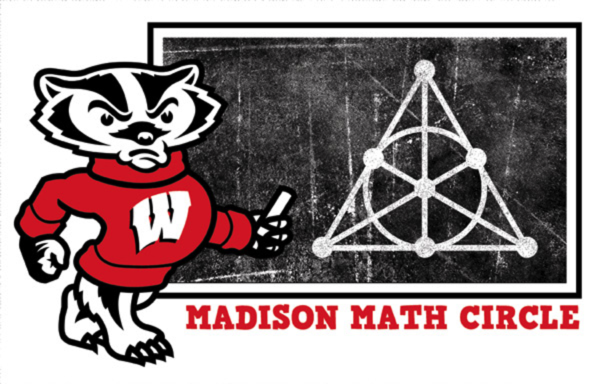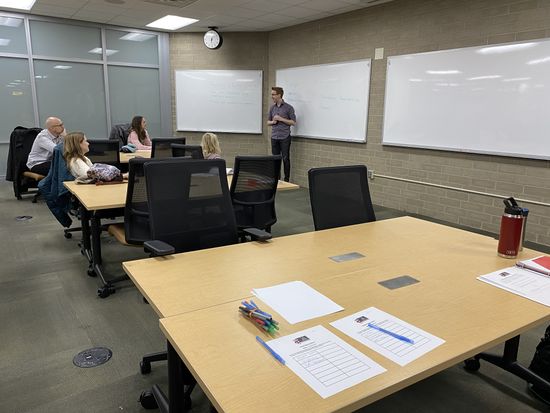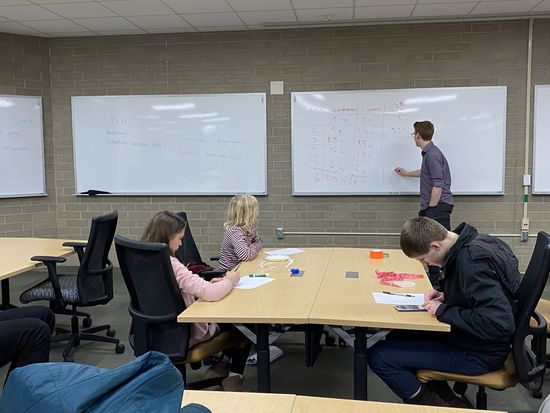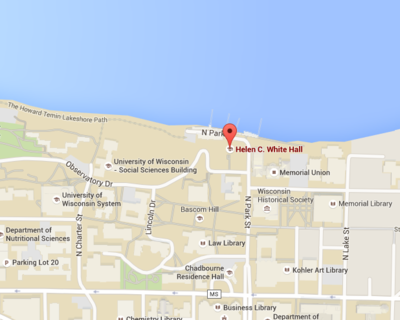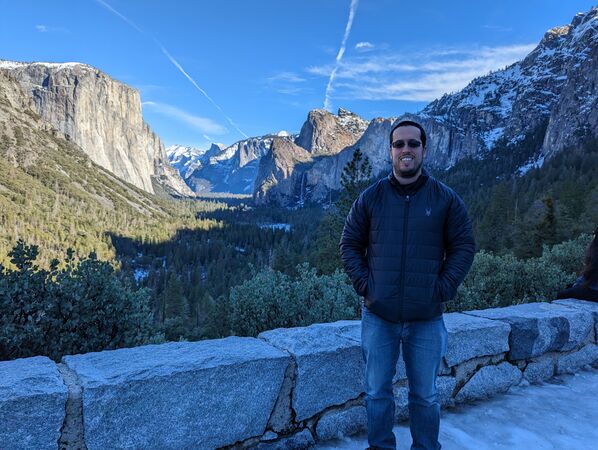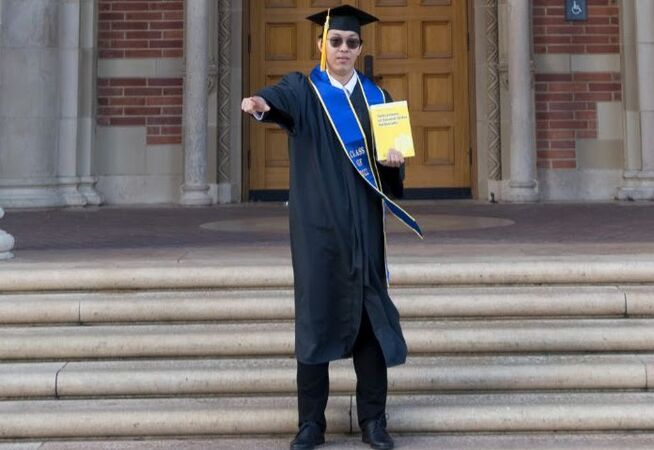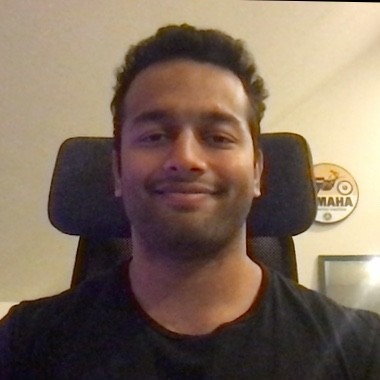Madison Math Circle: Difference between revisions
| Line 36: | Line 36: | ||
The topics for this workshop will cover an introduction to constructing mathematical arguments and proofs, understanding how to generalise simple mathematical ideas, and learn how to discover math for one's self. We will build these skills through collaborative problem solving sessions while learning about graph theory, game theory, and other cool areas of mathematics. | The topics for this workshop will cover an introduction to constructing mathematical arguments and proofs, understanding how to generalise simple mathematical ideas, and learn how to discover math for one's self. We will build these skills through collaborative problem solving sessions while learning about graph theory, game theory, and other cool areas of mathematics. | ||
We want to invite any middle school or high school students curious about math to join! If you are interested, please register using the form below | We want to invite any middle school or high school students curious about math to join! If you are interested, please register using the form below. As always, this workshop is free and only requires your curiosity and participation! We hope to see you there! | ||
[https://forms.gle/5QRTkHngWf43nmCC9 '''Math Circle Registration Form'''] | [https://forms.gle/5QRTkHngWf43nmCC9 '''Math Circle Registration Form'''] | ||
Revision as of 15:10, 14 February 2024
For the site in Spanish, visit Math Circle de Madison
What is a Math Circle?
The Madison Math Circle is a weekly series of mathematically based activities aimed at interested middle school and high school students. It is an outreach program organized by the UW Math Department. Our goal is to provide a taste of exciting ideas in math and science. In the past we've had talks about plasma and weather in outer space, video game graphics, and encryption. In the sessions, students (and parents) are often asked to explore problems on their own, with the presenter facilitating a discussion. The talks are independent of one another, so new students are welcome at any point.
The level of the audience varies quite widely, including a mix of middle school and high school students, and the speakers generally address this by considering subjects that will be interesting for a wide range of students.
After each talk we'll have pizza provided by the Mathematics Department, and students will have an opportunity to mingle and chat with the speaker and with other participants, to ask questions about some of the topics that have been discussed, and also about college, careers in science, etc.
The Madison Math Circle was featured in Wisconsin State Journal: check it out!
All right, I want to come!
Our in person talks will be at, Monday at 6pm in 3255 Helen C White Library, during the school year. New students are welcome at any point! There is no fee and the talks are independent of one another. You can just show up any week, but we ask all participants to take a moment to register by following the link below:
Math Circle Registration Form
All of your information is kept private, and is only used by the Madison Math Circle organizer to help run the Circle.
If you are a student, we hope you will tell other interested students about these talks, and speak with your parents or with your teacher about organizing a car pool to the UW campus. If you are a parent or a teacher, we hope you'll tell your students about these talks and organize a car pool to the UW (all talks take place in 3255 Helen C White Library, on the UW-Madison campus, right next to the Memorial Union).
Spring Enhancement Workshop
This Spring, we have a guest organizer for our Math Circle: Peter Juhasz teaches mathematics (grades 7-12) at Szent István Secondary School in Budapest. He has extensive experience teaching mathematics and mathematics education to college/university students, as well as teaching mathematics to secondary students. Péter is the chief organizer of various mathematics camps in Hungary, including those founded by Lajos Pósa and the Camp of Mathematical Amusements. He directs the Joy of Thinking Foundation, whose aim is to promote mathematics education of gifted students in Hungary.
Our Spring Enhancement Workshop helps students hone the various skills involved in higher mathematics. The workshop, titled the Math Circle Spring Enhancement Program Workshop (SEP) will be held from February 19 through May 6, on Mondays from 6:00pm - 7:00pm at the UW-Madison campus. Please see our schedule below for details.
The topics for this workshop will cover an introduction to constructing mathematical arguments and proofs, understanding how to generalise simple mathematical ideas, and learn how to discover math for one's self. We will build these skills through collaborative problem solving sessions while learning about graph theory, game theory, and other cool areas of mathematics.
We want to invite any middle school or high school students curious about math to join! If you are interested, please register using the form below. As always, this workshop is free and only requires your curiosity and participation! We hope to see you there!
Math Circle Registration Form
Fall Schedule
| Fall Schedule (see abstracts below) | |||
|---|---|---|---|
| Date | Location and Room | Program | Speaker |
| Sep 25th | 3255 Helen C White Library | FEP | Math Circle Team |
| Oct 2nd | 3255 Helen C White Library | Talks | Uri Andrews |
| Oct 9th | 3255 Helen C White Library | FEP | Math Circle Team |
| Oct 16th | 3255 Helen C White Library | Talks | Diego Rojas La Luz |
| Oct 23rd | 3255 Helen C White Library | FEP | Math Circle Team |
| Oct 30th | 3255 Helen C White Library | Talks | Oh Hoon Kwon |
| Nov 6th | 3255 Helen C White Library | FEP | Math Circle Team |
| Nov 13th | 3255 Helen C White Library | Talks | Aleksandra Cecylia Sobieska |
| Nov 20th | 3255 Helen C White Library | FEP | Math Circle Team |
| Nov 27th | 3255 Helen C White Library | Break | Happy Thanksgiving |
| Dec 4th | 3255 Helen C White Library | FEP (Competition) | Math Circle Team |
Abstract 10/2
| Uri Andrews |
| Title: How many paradoxes are there? |
|
"This statement is false". That's the so-called liar's paradox. (Think through why that statement cannot be either true or false). A paradox is a statement or collection of statements that cannot be meaningfully assigned truth values. Aristotle thought that all paradoxes were essentially the same as the liar's paradox. In 1985, Yablo found a different paradox (though there is some disagreement here). A brand new paper claimed to show that there are only 2 paradoxes (Yablo and the liar's paradox). I'll talk about all these topics and also a brand new paradox. Are there more than 2 paradoxes after all? |
Abstract 10/16
| Diego Rojas La Luz |
| Title: How to Not Die While Eating a Poisoned Chocolate Bar |
|
We are going to talk about Chomp, a game where you take turns eating chocolate and you try not to die from poisoning! This is one of those very easy-to-state combinatoric games which happens to be very hard to fully analyze. We'll see that we can say some rather surprising things regarding winning strategies, so stay tuned for that. Who wants to play? |
Abstract 10/30
| Oh Hoon Kwon |
| Title: Your (Life) Turning Points: Chasing Angles for Proofs |
|
We're bringing a fresh approach to Euclidean geometry by incorporating physical movements involving a pencil to illustrate proofs related to angle concepts. This inventive method acts as a potential link between inductive, exploratory techniques and deductive proofs. It provides students with a new perspective on Euclidean geometry, particularly in the context of angle concepts, making it an enjoyable and captivating way to engage with the subject. |
Abstract 11/13
| Aleksandra Cecylia Sobieska |
| Title: Trapezoid Numbers |
|
Perfect squares are numbers that can be represented as a square arrangement of dots, like 1, 4, 9, 16, and so on. This Math Circle, we will investigate a similar question: what numbers can be represented as a trapezoidal arrangement of dots? |
Directions and parking
Our meetings are held on the 3rd floor of Helen C. White Hall in room 3255.
Parking. Parking on campus is rather limited. Here is as list of some options:
- There is a parking garage in the basement of Helen C. White, with an hourly rate. Enter from Park Street.
- A 0.5 mile walk to Helen C. White Hall via these directions, many spots (free starting 4:30pm) in Lot 26 along Observatory Drive.
- A 0.3 mile walk to Helen C. White Hall via these directions, many spots (free starting 4:30pm) in Lot 34.
- A 0.3 mile walk to Helen C. White Hall via these directions, 2 metered spots (25 minute max) in front of Lathrop Hall.
- A 0.2 mile walk to Helen C. White Hall via these directions 6 metered spots (25 minute max) around the loop in front of Chadbourne Hall .
- For more information, see the UW-Madison Parking Info website.
Email list
The best way to keep up to date with the what is going is by signing up for our email list. Please add your email in the form: Join Email List
Contact the organizers
The Madison Math Circle is organized by a group of professors and graduate students from the Department of Mathematics at the UW-Madison. If you have any questions, suggestions for topics, or so on, just email the organizers here. We are always interested in feedback!
Donations
Please consider donating to the Madison Math Circle. Our main costs consist of pizza and occasional supplies for the speakers. So far our costs have been covered by donations from the UW Mathematics Department as well as a generous gifts from private donors. The easiest way to donate is to go to the link:
There are instructions on that page for donating to the Math Department. Be sure and add a Gift Note saying that the donation is intended for the "Madison Math Circle"! The money goes into the Mathematics Department Annual Fund and is routed through the University of Wisconsin Foundation, which is convenient for record-keeping, etc.
Alternately, you can bring a check to one of the Math Circle Meetings. If you write a check, be sure to make it payable to the "WFAA" and add the note "Math Circle Donation" on the check.
Or you can make donations in cash, and we'll give you a receipt.
Help us grow!
If you like Math Circle, please help us continue to grow! Students, parents, and teachers can help by:
- Like our Facebook Page and share our events with others!
- Posting our flyer at schools or anywhere that might have interested students.
- Discussing the Math Circle with students, parents, teachers, administrators, and others.
- Making an announcement about Math Circle at PTO meetings.
- Donating to Math Circle.
Contact the organizers if you have questions or your own ideas about how to help out.
Useful Resources
Archived Abstracts
2015 - 2016 Math Circle Page (Spanish)
Link for presenters (in progress)
Advice For Math Circle Presenters
Sample Talk Ideas/Problems from Tom Davis
